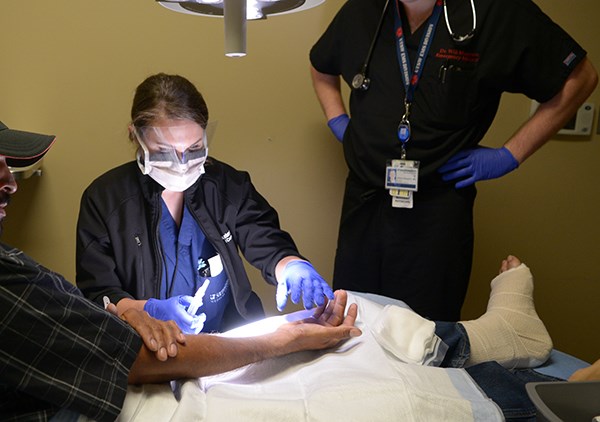Dear Intern,
Today you looked at me with a face that begged the question, "Am I terrible?" Yes, intern - yes, you are.
Intern, you have been a doctor for only a few hours. You expect to confidently manage multiple patients and only struggle slightly with our unknown hospital system, not to mention our new EMR, and all the ED staff whom you have just met, and all the consultants you've only spoken to on the phone, whom you have also never met. You expect that you can do all of these things for your entire shift without being too terrible. This is not a realistic expectation. You cannot do these things yet. You may not believe me, but this is normal.
You are trying very hard, dear intern. You are also very smart. The fact that you are struggling right now does not mean your imposter syndrome was correct, that in fact you are stupid, and have been stupid for all of these years, through high school, college, medical school, and whatever other degrees you probably also possess. You are not a stupid person, but that does not mean you might not be failing right now, and that you will not continue to fail for an indeterminate period of time, and that even when you succeed, that you might not fail again in the future.
Dear intern, when you work in a new system, when you have to document in a new EMR that seems more focused on making you write notes in 80 different locations while also putting in orders that disappear into the ether, it is normal to struggle. It is normal to suddenly become worse at the things you used to be good at, like taking histories, and interacting with patients, and not accidentally cursing in the middle of the care area when you get startled. We all get worse before we get better.
Dear intern, if you feel like you are a liar when you tell patients you are Dr. So-and-so, don't worry; you're not lying, even though you certainly do not feel like a doctor for these first few days, or weeks, or even months. It seems like a doctor should know quite a bit more than you know, that they should be confident, ooze knowledge and intelligence, and understand how to get lidocaine out of a bottle without exploding it in their face, thus filling their eyeballs with lidocaine and having numb eyeballs for an entire shift (not to say that ever happened, of course). And I certainly have never dropped, at least once, every single piece of a central line kit on the floor, or accidentally shot the wire across the room when I was trying to look smooth by removing the wire cap with a flick of my thumb. Of course I have never done these things, dear intern, because probably I was never an intern. Probably I magically achieved my attending-level of knowledge and confidence and skill through no hard work of any sort but through wizardry; really, I did not need residency at all.
But you must know this cannot be true. You may have detected sarcasm, dear intern, if you looked hard with your tired, lidocaine-filled eyeballs. We have all struggled. We are all smart people who have occasionally looked stupid. We have all done things that we think prove we don't know anything, and that we are unfixable, or unteachable, or that we will never actually be good doctors. It is normal to feel like this. But do not worry, this is why residency exists: so that you can continue to be terrible while we help you and while your patients teach you so much more than we ever could. Because one day, many months from now, you will realize you are in fact not terrible, that all of your hard work is paying off, that you actually know what to do for your patient with chest pain, and how to explain the CT results to your patient with new cancer, all without having to check with me.
And then one day, even farther along than that, you will not need me at all.
You will do all of these things by yourself. And while you are growing, and while you are failing, and while you are slowly learning to not be terrible, I will be learning with you. You will not know it, but you will actually be teaching me many more things than I will be teaching you.
And so, dear intern, to answer your question: are you terrible? Maybe a little bit, but you are certainly less terrible than I was in July of my intern year, and if you keep working hard, and if I also keep working hard, I have no doubt you will one day be a much better doctor than I.
Yours with love,
Dr. Attending



